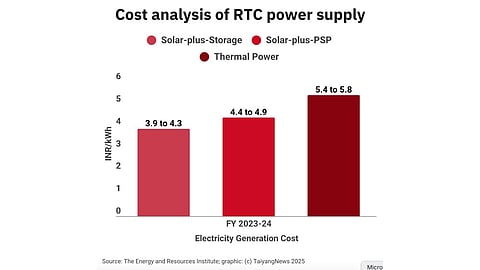

Solar-plus-storage is now cheaper than new thermal plants for RTC electricity in India, according to a TERI study
It shows that a 2-hour BESS can meet full daily demand efficiently and cost-effectively
Falling solar tariffs and expanding storage are key to India’s 24x7 clean energy future, recommend the analysts
A new analysis by The Energy and Resources Institute (TERI) shows that solar power, combined with storage systems, is now more cost-effective than new thermal power plants for round-the-clock (RTC) electricity. In India, solar-plus-storage costs range from INR 3.9 to INR 4.9 ($0.044 to $0.056)/ kWh, compared to INR 5.4 to INR 5.8 ($0.061 to $0.066)/kWh for new thermal generation.
Even for a solar-plus-pumped storage plant (PSP), the cost is higher at INR 4.4 to INR 4.9 ($0.050 to $0.056)/kWh.
Analysts arrived at this cost difference during a study of the per-unit energy cost of the complete power supply for Delhi utility BSES Rajdhani Power Limited (BRPL). Researchers analyzed BRPL’s 2022–23 electricity demand by selecting 4 representative days across seasons. Using PVWatts, they modeled hourly solar generation for each day and compared it with demand to determine direct solar usage and storage needs. Solar and storage capacities were then iteratively adjusted to meet full daily demand.
Based on prevalent tariff benchmarks, the team assumed INR 2.5 ($0.028)/kWh as the solar generation cost, while it was INR 3.81 ($0.043)/kWh for PSP and INR 2.8 ($0.032)/kWh for 2-hour BESS systems. TERI used a 2-hour battery storage system as a cost reference. It believes multiple such systems can be installed to meet daily electricity demand.
According to its methodology, the team only studied the generation and storage costs for this study. Its assessment does not include additional costs such as transmission charges and losses, open access charges, wheeling charges, cross-subsidy charges, and financing costs.
Solar-plus-storage configurations are already competitive with new thermal generation, according to the study. These are more viable and cleaner 24/7 supply options, thanks primarily to an over 90% decline in solar tariffs in the past decade. Expanding affordable storage should be the next step towards India’s 24/7 green future, stress the researchers.
In the latest Solar Energy Corporation Limited (SECI) tender for the 2 GW ISTS-connected tranche-XX solar PV project with 1 GW/4,000 MWh energy storage systems (ESS), winning bids breached the INR 3.00/kWh mark for a solar-plus-4-hour energy storage system (ESS) with the lowest tariff of INR 2.86 ($0.033)/kWh.
